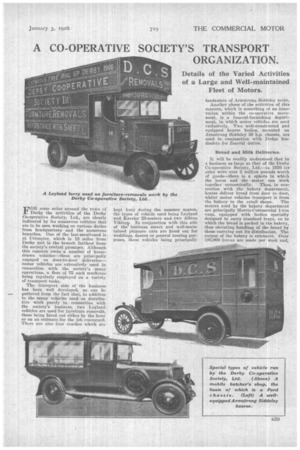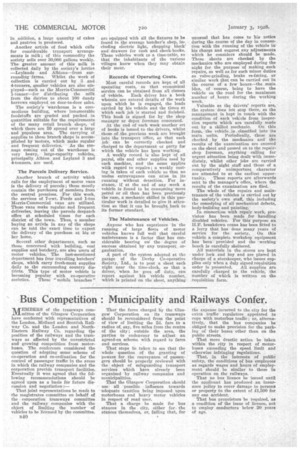A CO-OPERATIVE
Page 57

Page 58

If you've noticed an error in this article please click here to report it so we can fix it.
SOCIETY'S TRANSPORT
ORGANIZATION.
"DOR some miles around the town of
Derby the activities of the Derby Co-operative Society, Ltd„ are clearly indicated by its numerous, vehicles that are to he seen working on various duties from headquarters and the numerous branches. One of the last-mentioned is at Uttoxpter, which is 18 miles from Derby and is the branch farthest from the society's central premises. Although this concern owns a number of horsedrawn vehicles—these are principally engaged on door-to-door deliveries— motor vehicles are extensively used in connection with the society's many operations, a fleet of 75 such machines being regularly employed on a variety of transport tasks.
The transport side of the business has been well developed, as can be gathered from the fact that, in addition to the many vehicles used on distributive work purely in connection with the society's business, two Leyland vehicles are used for furniture removals, these being hired out either by the hour or on an estimate for the job concerned. There are also four coaches which are
kept busy during the summer season, the types of vehicle used being Leyland and Karrier 28-seaters and two Albion Viking. In conjunction with this side of the business smart and well-maintained pleasure cars are hired out for weddings, dances or general touring purposes, these vehicles being principally landaulets of Armstrong Siddeley make.
Another phase of the activities of this concern, which is something of an innovation within the co-operative movement, is a funeral-furnishing department, in which motor vehicles are used exclusively. Two well-constructed and equipped hearse bodies, mounted on Armstrong Siddeley 30 h.p. chassis, are used in conjunction with Dodge landaulets for funeral duties.
Bread and Milk Deliveries.
It will be readily understood that in a business as large as that of the Derby Co-operative Society, Ltd.—in 1926 its sales were over 2 million pounds worth of goods—there is a sphere in which the horse and the motor can work together economically. Thus, in Connection with the bakery department, horses deliver bread from door to door, whilst motor vehicles transport it from
the bakery to the retail shops. The motors used by the bakery department are principally Morris-Commercial 1-ton vans, equipped with bodies specially designed to carry standard trays, on to which the bread is packed in the bakery, thus obviating handling of the bread by those carrying out its distribution. The Output of the bakery is extensive. Over 195,000 loaves are made per week and, in addition, a large quantity of cakes and pastries is produced.
Another article of food which calls for considerable transport arrangements is milk ; of this commodity the society sells over 30,000 gallons weekly. The greater amount of this milk is collected daily by the society's lorries —Leylands and Alhions—from surrounding farms. Whilst the work of collection is carried out by 3 and 4tonners, emaller vehicles are also employed—such as the Morris-Conimereial 1-tonner—for distributing the milk from the dairies to about 100 dandy barrows employed on door-to-door sales.
The society's warehouse is a cornmodious building, where innumerable foodstuffs are graded and packed in quantities snitable for the -requirements of the many retail branch shops, of which there are 59 spread over a large and populous area.. The carrying of supplies to these branch shops is accomplished by -motors, which make regular and frequent deliveries. • As the tennage coming out of the warehouse is very heavy, • large-capacity vehicles, principally. Albion and Leyland 3 and 4-tonners, arc used.
The Parcels Delivery Service.
Another branch of . activity which calls for the employment of motor vans is the delivery of parcels; these mostly contain the purchases of members from the central premises. For this work, the services of 7-cwt. Fords and 1-ton Morris-Commercial vans are utilized. These vans make regularand frequent deliveries, leaving the parcels despatch office at scheduled times for each district of the town. Thus, a member buying an article in any of the shops can be told the exact time to expect the delivery of the purchase at his or her home.
Several other departments, such as those concerned with building, coal supplies and butchery, are also users of motor vehicles. The last-mentioned department has four travelling butchers' shops, which carry fresh-meat supplies daily to the surrounding country districts. This type of motor vehicle is becoming popular with co-operative societies. These "mobile branches"
ecords of Operating Costs.
are quipped with all the fixtures to be fou d in the average butcher's shop, includjing electric light, chopping block' andj drawers for cash and cheek-books. Thee vehicles work to a time-table, so thalj the inhabitants of the various villages know when they may obtain theiL meat.
ecords of Operating Costs.
Most careful records are kept of all operating costs, so that economical service can be obtained from all classes
of ehiele. Each driver has a book wh rein are entered details of the work upos which he is engaged, the loads ear led by his vehicle and the times at whi h each job is started and finished. Thi book is signed for by the shop matlager or depot foreman concerned.
At the end of each week another set of books is issued to the drivers, whilst those of the previous week are brought inti the transport• office, so that each job ' can be correctly checked and c'ha ged to the department or party for whi h the vehicle has been working.
weekly record is also kept of all pet ol, oils and other supplies used by eaelii machine, and the same applies wits regard to repairs ; a weekly costing is taken of each vehicie so that no undjue extravagance can arise in its run mg without detectiOn. For instaire, if at the end of any week a vehlcic is found to be consuming more petiFol or oil than has been previously the case, a mechanic skilled in this partieujlar work is detailed to give it attentioij so that it can be brought back to its former standard.
he Maintenance of Vehicles.
nyone who has experience in the run ing of large fleets of motor veh cies knows full well that careful maijntenance is a factor that has consid rable bearing on' the degree of sue ess obtained by any transport organ zation A part of the system adopted at the garage of the Derby Co-operative Soclety, Ltd., is to post a sheet each night near the time-clock, so that a driver, when he goes off duty, can report against his vehicle number, which is printed on the sheet, anything
unusual that has come to his notice during the course of the day in connection with the running of the vehicle in his charge and suggest any adjustments which be considers should be made. These sheets are checked by the mechanics who are employed during the night for the purpose of making such repairs, as well as for such minor duties as valve-grinding, brake re-facing, or similar work that can be carried out in the course of a few hours—the main idea, of course, being to have the vehicle on the road for the maximum number of hours during the working week. Valuable as the drivers' reports are, the system does not step there, as the management ie kept in touch with the condition of each vehicle from inspection reports which are carefully made out by a skilled mechanic. On this form, the vehicle is classified into its main units. Periodically, these are checked by the mechanics and the results of the examination are entered on the sheet and passed on to the repairshop foreman, anything calling for urgent attention being dealt with immediately, whilst other jobs are carried out by the night staff and those of a comparatively unimportant character are attended to at the earliest oppor tunity. These reports are afterwards sent to the manager's office., where the results of the examination are filed.
The whole of the repairs and maintenance of the vehicles is carried out by the society's own staff, this including the remedying of all mechanical defects, body-building and painting.
In connection with repair work, provision has been made for handling disabled vehicles. For this purpose an II.F. breakdown crane has been fitted to a lorry that has done many years of service for the society. . On this vehicle a complete workshop equipment has been provided and the -working bench is carefully sheltered.
All materials in the stores are kept under lock and key and are placed in charge of a storekeeper, who issues supplies only when a duly signed requisition order is presented. All supplies are carefully charged to the vehicle, the number of which is written on the requisition form.




































































































